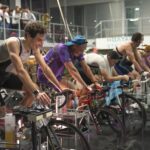I’ve been in the sports world since I was six years old. The first 20 years, I was an athlete (a ski racer) learning the ups and downs of sports the hard way, mostly through trial and error, and sometimes painful failure. That, I can say with 20/20 hindsight and absolute certainty, is no way to figure out what it takes to be the best athlete you can be. Sure, even the best athletes in the world have to make a lot of mistakes and fail on the way to success. But it is a whole lot easier if you have at least some sense of what works and what doesn’t.
In addition to having a robust athletic life as an adult (2nd degree black belt in karate, marathon runner, Ironman triathlete), the last 35 years of my sports life have been devoted to helping athletes (and coaches and parents) figure things out before they have problems, so when those problems arise, rather than flailing around, they have some plan for finding solutions.
One of the biggest lessons I’ve learned over these many years in sports, and one that many young athletes don’t seem to get, is that training really does matter. Too often, I see athletes pretty much wasting their time in training; all the things that are necessary for quality training just aren’t there very often. I can’t tell you how much it irritates me when I’m working with young athletes and see them do things that so obviously prevent them from getting the most out of their training. With that said, let me present to you my 4 Biggest Pet Peeves in Sport Training:
- Talking to other athletes just before they do a drill. Focus is the most important mental contributor to quality training. Yet, what do I see more often than not before athletes before a training segment? Athletes chatting it up, continuing to talk when they are about to go, and, amazingly enough, athletes who are still talking to their pals as they begin the drill. What’s missing here? Focus, of course. They are focusing on their conversations and what is behind them. What they should be focusing on is what they are working on and what lies ahead in the drill or exercises.
Tip: About two minutes before your turn, stop talking to the athletes around you. Narrow your focus, do some mental imagery of your upcoming effort, and focus on what you’ll be working on.
- Cruising into the drill. Competitions begin when the clock starts or the whistle blows. But you wouldn’t know it by the way many athletes approach the start of training. I regularly see young athletes ease into a drill or exercise before settling in and going for it. This habit of working their way into training is related to intensity. Sports require power, quickness, and agility. If you don’t have the right intensity from the moment you go, you’re wasting your time.
Tip: Adjust your intensity before you are about to go. Either fire up or calm your mind. And then go hard right away.
- Giving up without a fight in training. This is my number-one pet peeve when it comes to training. So many athletes will give up when it gets a little difficult or they make a mistake. What a truly terrible habit to get into! If you get used to giving up at the smallest problem in training, that’s what you’re training your mind and body to do in a competition. There are usually some deeper psychological issues at play here that cause athletes to bail out at the slightest mistake, notably perfectionism and fear of failure). But the bottom line is that when you give up, one thing happens 100 percent of the time: you lose, whether not improving in training or a poor performance in a competition.
Tip: Fight for your life from start to finish. Learning to never give up after a mistake or when it gets hard will serve you well in competitions where even the top athletes make mistakes, but get it right back and fight to the end.
- Easing up at the end of training. I see so many young athletes ease up let up before the end of training. This is another habit that drives me crazy. Just like with cruising into training, athletes are ingraining letting up before they finish. How often have you seen a athlete having a good performance and then, near the end make a big mistake? This frustrating experience usually occurs because athletes think they’re finished and lose focus and intensity. But, just as competitions begin at a certain point, they end at a particular time as well (e.g., at the finish line, when the horn blows), so you need to make sure that you are focused and intense all the way to the end.
Tip: In training, always push hard to the very end.
It’s never too late to begin mental training during a race season. Take a look at my online mental training courses designed specifically for athletes.






